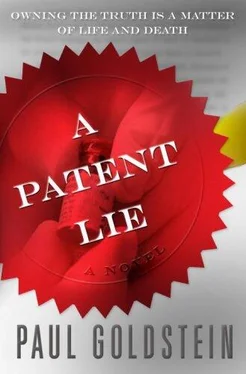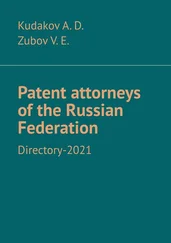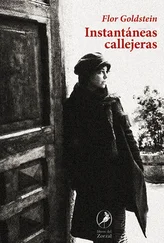Paul Goldstein - A Patent Lie
Здесь есть возможность читать онлайн «Paul Goldstein - A Patent Lie» весь текст электронной книги совершенно бесплатно (целиком полную версию без сокращений). В некоторых случаях можно слушать аудио, скачать через торрент в формате fb2 и присутствует краткое содержание. Жанр: Криминальный детектив, на английском языке. Описание произведения, (предисловие) а так же отзывы посетителей доступны на портале библиотеки ЛибКат.
- Название:A Patent Lie
- Автор:
- Жанр:
- Год:неизвестен
- ISBN:нет данных
- Рейтинг книги:3 / 5. Голосов: 1
-
Избранное:Добавить в избранное
- Отзывы:
-
Ваша оценка:
- 60
- 1
- 2
- 3
- 4
- 5
A Patent Lie: краткое содержание, описание и аннотация
Предлагаем к чтению аннотацию, описание, краткое содержание или предисловие (зависит от того, что написал сам автор книги «A Patent Lie»). Если вы не нашли необходимую информацию о книге — напишите в комментариях, мы постараемся отыскать её.
A Patent Lie — читать онлайн бесплатно полную книгу (весь текст) целиком
Ниже представлен текст книги, разбитый по страницам. Система сохранения места последней прочитанной страницы, позволяет с удобством читать онлайн бесплатно книгу «A Patent Lie», без необходимости каждый раз заново искать на чём Вы остановились. Поставьте закладку, и сможете в любой момент перейти на страницу, на которой закончили чтение.
Интервал:
Закладка:
After that, they could have been strangers, or a father and his son, the way that they finished their meal in brooding silence.
Seeley spent the rest of the day preparing for tomorrow's witnesses. He needed a break from Palmieri, and the young partner didn't complain when Seeley sent him off to write the first draft of his closing argument. McKee was in and out of Seeley's office, educating him on technical details of the AV/AS patent that Seeley would need for his cross-examination. It was almost 11:00 when Seeley filled his briefcase with papers and turned out the lights.
As much as he enjoyed his solitary morning walks from the Huntington down to Heilbrun, Hardy's offices, it was retracing that route at night, the great dark bay at his back, that truly gave Seeley pleasure. Except for Grant and Stockton, still a blaze of neon with streams of shoppers and late-night diners, the maze of streets spidering out from the Embarcadero along and across the borders of Chinatown was deserted at this hour. The signs on the darkened storefronts mixed Chinese characters with English words and, in the shuttered tenements that rose above them, Seeley felt the presence of alien lives, sleeping, eating, watching the Chinese soap operas on cable. He felt safer on this empty street than he did across a restaurant table from Thorpe.
He thought of Lily, as he had throughout the day. If he could persuade her to tell the Chronicle what she knew about Steinhardt and his work on AV/AS, that could be the trigger for the mistrial that he needed. Each time, though, Seeley dismissed the thought of asking her for help. It wasn't Judge Farnsworth's order not to talk with the media, directly or through others, that concerned him; he could handle those consequences if he had to. No, he admitted to himself, what stopped him was the simple thought of picking up the phone. Asking for help was Leonard's weakness, not his.
As he crossed Joice Street, a dim alley off Sacramento, Seeley felt his skin prickle. He sensed that he was no longer alone. A sound like the rattling of dry leaves swept up the alley-his thoughts shot back to the dark sedan by the railroad tracks-but the tempo was pointed and rhythmic and had an unmistakably human source.
The rattling stopped, and an instant later a sharp blow at the back of Seeley's knees sent him crashing to the pavement. A second blow stung a shoulder, and his chin struck the asphalt. A burst of high-pitched chatter like a quarrelsome flock of birds flew up from his assailants, and at once pointed sticks expertly dug and prodded at his body. The voices were harsh and nasal, and the words-it sounded like an Asian language-were as sharp as the probing sticks. His attackers were rebuking him for some offense.
In English, one cried, “DO NOT ENTER! DO NOT ENTER!”
Seeley turned in the direction of the screeching demand and raised himself, crooking an arm to protect his eyes from the continuing blows. He was looking at a boy, no older than seventeen or eighteen, his long dark hair streaked with blond, frantically shaking a bamboo rod in the direction of a street sign where the alley began. Seeley was stunned that the blows had already driven him this far from the intersection.
“DO NOT ENTER! DO NOT ENTER!”
The traffic sign at which the boy was pointing displayed a red circle with a slash through it, warning drivers not to enter the one-way alley. The boy's cries turned to shrieks of hysteria as he gestured with the bamboo to his companions. All three were in T-shirts and baggy chinos cut off above the ankle, rubber flip-flops on their feet. At a whoop from the leader, there was a flurry of lashings, several striking Seeley across the ribs, others pummeling his sides. The pain of each blow was excruciating, but Seeley forced himself not to cry out; he would not give them that satisfaction.
“DO NOT ENTER!” the leader jeered, his laughter pure idiot hatred.
The alley was empty, as was the crossing where the sticks first brought him down. Seeley could make out figures moving along Clay Street at the other end of the alley, but they were too distant to hear him even if he did call out. Street grit scraped at his jaw; the stench of garbage rotting at the curb sickened him. From his dog's-eye view the long brick wall of a building stretched across from him. Behind him, he remembered, was an empty parking lot surrounded by a torn chain-link fence. Even if anyone was watching from the dark tenements, no one would call for help. He had to get up; lying on the street like this, he could not possibly maneuver. But when he moved to rise, the beatings quickened.
Seeley felt a tug of nausea, the taste of copper at the back of his throat. These are kids, he told himself. If they were going to rob or seriously injure him, they would have done so by now. Ignoring the pain, he pushed himself up, forced his body into a crouch, waited for his strength to gather, then lunged at the youth closest to him, the leader. He caught the boy's wrist and, twisting it against his back so that the bamboo dropped, Seeley lifted and hurled him against the chain fence. The surprise of the boy's weightlessness threw Seeley off balance. When the dazed youth came back at him-a rebound, not an act of will-Seeley circled one arm around a thin neck and with the other again pulled the boy's arm up behind his back.
While his captive gasped and whimpered, the two other youths froze, staring at Seeley, uncertain of what the rules now were. Panic replaced the empty looks and one, then the other, dropped their bamboo rods and ran off in the direction of Clay Street. So much for loyalty, Seeley thought. The leader was shivering in Seeley's grip, his entire body exhaling a spoiled, meaty smell. Breathless, Seeley said, “What's this about?”
The panting youth didn't answer.
Through the cheap T-shirt, Seeley felt the boy's heart beating frantically, like a small bird's. He said, “Your friends aren't coming back to help you.” Against his will, Seeley felt sympathy for the terrified boy-why did he take pity on his tormentors? — and thrust him away. “Get out of here!”
Staggering, the boy went down the alley where the others had gone. Pain seeped into Seeley's bones as he bent down, lifted the bamboo rods, and threw them over the chain-link fence. Then he walked to the corner and retrieved his briefcase.
The traffic on Sacramento was light and none of the few pedestrians noticed as Seeley made his slow, unsteady way up the hill. He thought about the strangeness of the encounter. The boys had demanded nothing from him. Not a word they said, in English at least, indicated racism. He would have expected a street thug to be strong, a scrapper, yet the leader was a weakling and his companions were cowards; had he restrained the boy any more strenuously, Seeley was certain that he would have snapped his bones. The oddest part was how dispassionately, almost casually, the attack unfolded, even the leader's rant about the do not enter sign. It was as if the boys were amateurs reading a script for the first time. Their panic, when Seeley struck back, was as much from ignorance as fear.
When Seeley came into the Huntington lobby, the clerk at the reception desk greeted him gaily, then stopped short. “Are you all right, Mr. Seeley?” The worried look showed more than professional concern. “Would you like us to call a doctor?”
Seeley realized that he had no idea how torn-up he looked. “No, I'm fine. Thanks.”
The man's look lingered for another moment as if he were making a decision. Then he gestured for Seeley to wait as he retrieved an envelope from beneath the counter.
The cheap feel of the unmarked envelope as Seeley opened it reminded him of his attacker's thin T-shirt. Inside the envelope was a folded square of newsprint, no larger than a cocktail napkin, advertising an expensive brand of wristwatch. He turned the scrap over and at once recognized the typeface of the San Francisco Chronicle. The story had the terse rhythm of the police blotter and was about gangs of three to five Vietnamese youths attacking lone pedestrians, evidently without discrimination, usually at night in deserted areas, but occasionally even on crowded sidewalks during the day. Sometimes wallets, purses, and watches were taken, other times not; always the attacks were conducted with bamboo sticks the length of a fishing rod or longer.
Читать дальшеИнтервал:
Закладка:
Похожие книги на «A Patent Lie»
Представляем Вашему вниманию похожие книги на «A Patent Lie» списком для выбора. Мы отобрали схожую по названию и смыслу литературу в надежде предоставить читателям больше вариантов отыскать новые, интересные, ещё непрочитанные произведения.
Обсуждение, отзывы о книге «A Patent Lie» и просто собственные мнения читателей. Оставьте ваши комментарии, напишите, что Вы думаете о произведении, его смысле или главных героях. Укажите что конкретно понравилось, а что нет, и почему Вы так считаете.












